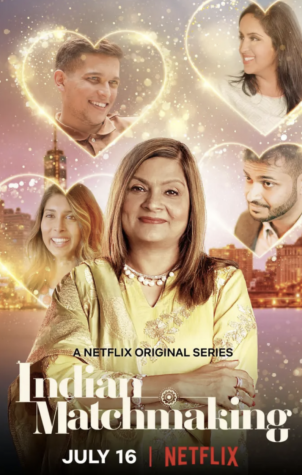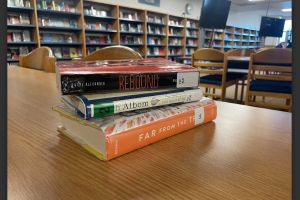Indian Matchmaking makes culture into a joke
August 7, 2020
For centuries, our society has used stereotyping to define people, their backgrounds, and their cultures. Hiding behind highly broadcasted forms of racial stigma, stereotyping has plagued all races and pushed them into tight corners where pressure and prejudice silently lurk. In Netflix’s new show Indian Matchmaking, widely-known Mumbai-based matchmaker Sima Taparia embarks on a mission to set up Aparna from Texas, Nadia from New Jersey, and Pradhyuman from Mumbai, as well as a few others, with their lifelong companions.

Taking each of their personalities, goals, and careers into account, Taparia uses assistance from her database to match her clients with someone who would positively impact them. Taparia uses Indian traditions with a modern twist to share the Indian matchmaking experience.
As an Indian-American, people often have the expectation that I will end up in an arranged marriage. When these statements are delivered to me, I stare dumbfounded, not knowing how to respond to the person without blowing my top off in rage over their ignorance. Part of me wants to place sole blame on the person for their act of covert racism; however, I know the media is partially to be blamed for not properly representing my experiences as an Indian-American person.
The reality show dives into the love lives of various Indian characters. Showing the struggle of first dates to the pressure of decision-making, the show attempts to give a glimpse at an important stage in many Indians’ lives.
Despite making a trying attempt, Indian Matchmaking desperately fails at delivering a proper look into the matchmaking process. Even as a reality show, Indian Matchmaking does not provide any viable, initial information on the technicalities of matchmaking. Jumping right into the battlefield, Indian Matchmaking begins with Taparia asking each of her clients what they want in a partner. Personally, as an Indian-American myself, I would have appreciated seeing my culture explained right off the bat, rather than having people unfamiliar with Indian practices piece together fragments of Indian traditions and make a conclusion based on them.
With little to no representation of Indian culture in mainstream American media, I would have liked to see Indian Matchmaking delve deeper into the ethnic roots of matchmaking and embrace the concepts of arranged marriage.
The show definitely focused on specific aspects of the Indian societal structure, shedding light on the problems of misogyny and colorism. I don’t necessarily think that bringing up these topics was a bad move, but by selectively choosing these issues to create entertainment out of the arranged marriage system, the show ignorantly causes a lack of awareness to occur in unfamiliar viewers, creating negative Indian stereotypes that undermine the entire Indian culture.
Along with doing a terrible job of sharing the Indian practice of matchmaking, the show delivers on cheesy dialogue and easily dislikable characters. While watching the show, I found myself cringing hard a couple of times from listening to the demands of Taparia’s clients and watching the awkward dates between them. I wasn’t able to root for any of the characters due to the disconnect I felt with them. I can’t even imagine how a non-Indian could possibly find interest in any of the characters, when I, an Indian-American, wasn’t able to do so.
Nevertheless, the dialogue did provide some laughs when I wasn’t consciously thinking about its implications on the Indian culture. Especially with characters like Aparna and Pradhyuman, it was easy to get caught up in their blissful narcissism and idealistic matches, providing the only entertaining factor in the show since their character development utterly sucked. Also, after three episodes, the plot became overly repetitive as the show presented more characters that Taparia put in uncomfortable situations and, ultimately, could not help.
That being said, Indian Matchmaking delivers with its post-production skills. The transitions between characters are clear enough so that viewers can comfortably understand each storyline. Even with old stereotypes projected through the dialogue, Indian Matchmaking serves up a modern twist to its editing structure, keeping viewers interested with the colors and text on the screen.
If you are looking for a new show to pass time, I would recommend Indian Matchmaking. However, if you are interested in educating yourself on the Indian culture, I would advise you to look into documentaries rather than this show, since it does a terrible job in representing a beautiful custom.
Rating: 4/10







